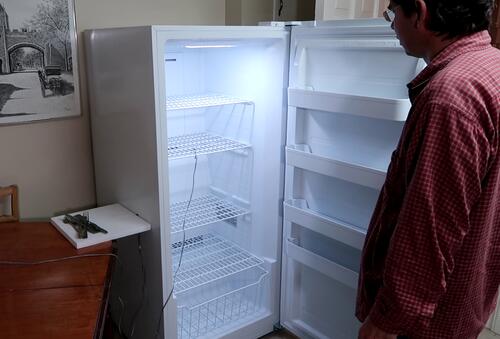 We recently bought a new upright freezer.
We recently bought a new upright freezer.
 We recently bought a new upright freezer.
We recently bought a new upright freezer.
I was curious how long things stay frozen in the freezer when there is a power outage. U already gave Raspberry Pi computers with temperature sensors on them from things like this experiment, this one or this one
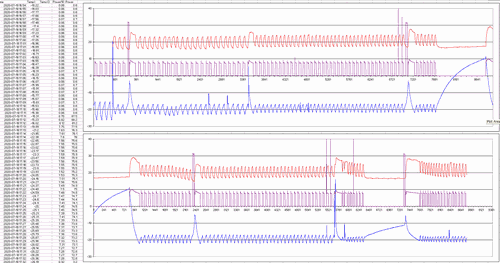 I ran various experiments with the freezer empty and full, logging internal temperature,
external wall temperature and power consumption every 30 seconds. I measured the power
consumption using a TP-LINK HS110 smart plug, which is not too difficult to read using
a python script. You can download my data
I ran various experiments with the freezer empty and full, logging internal temperature,
external wall temperature and power consumption every 30 seconds. I measured the power
consumption using a TP-LINK HS110 smart plug, which is not too difficult to read using
a python script. You can download my data
Normally the freezer turns on the compressor roughly or twice an hour, with a typical duty cycle of about 40%. This is with the freezer internal temperature around -20° C and the ambient in the basement room at about 19° C.
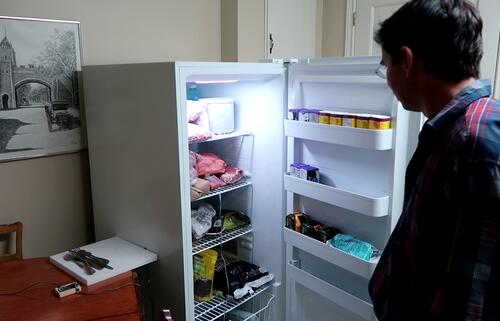 I first measured how long the freezer stayed cold with it completely empty. That's
easy enough because it doesn't risk spoiling food. But the freezer
internal temperature went up to 0° C in just 3.5 hours. I know stuff stays
frozen longer than that, and an empty freezer is not a realistic test.
So I moved the food from our basement fridge's freezer into this one and tested again.
I first measured how long the freezer stayed cold with it completely empty. That's
easy enough because it doesn't risk spoiling food. But the freezer
internal temperature went up to 0° C in just 3.5 hours. I know stuff stays
frozen longer than that, and an empty freezer is not a realistic test.
So I moved the food from our basement fridge's freezer into this one and tested again.
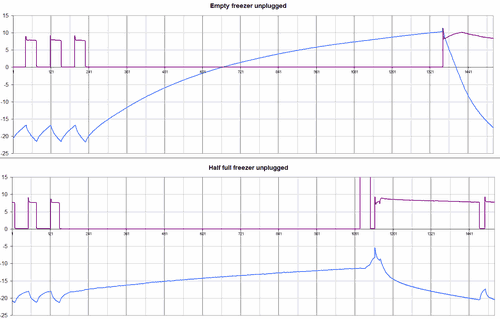 But with the food in the freezer, I didn't want to let it actually thaw. At left, upper
graph is the temperature rising with no food in it, lower graph is with food.
The darker grid lines are one hour increments.
After 3.5 hours with food in it, it went up to -14° C.
After 7.5 hours, it got up to -11.5°. I then plugged the freezer in again.
But with the food in the freezer, I didn't want to let it actually thaw. At left, upper
graph is the temperature rising with no food in it, lower graph is with food.
The darker grid lines are one hour increments.
After 3.5 hours with food in it, it went up to -14° C.
After 7.5 hours, it got up to -11.5°. I then plugged the freezer in again.
Based on this, I worked out that the freezer lost 2.6% of its coolness for every hour it had no power. With the room at 19 ° C ambient, it would hit 0° at about 26 hours in. But food is not pure water, so some of it would thaw before hitting that temperature. That in turn would help keep the freezer cold, so I'm sure once the temperature got to -5° C, the model would no longer hold. However, it would take about 18 hours to get to that temperature, and the freezer was less than half full.
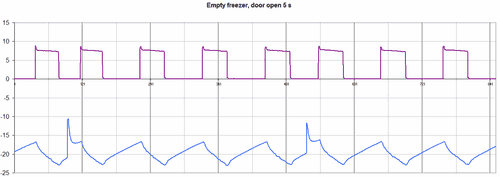 When the power goes out, we avoid opening the fridge and freezer to keep the cold inside.
I wanted to know how much of an effect opening the door would have.
With the freezer empty, I opened the door twice while logging the
temperature. Both times the freezer compressor was off while I did this. The first time
I did this the time between compressor runs was reduced by 14 minutes, from 33 minutes
typical to 19 minutes. The second time, it was 9 minutes less. I think I had the door open a
bit longer the first time. The second time I timed it at five seconds.
When the power goes out, we avoid opening the fridge and freezer to keep the cold inside.
I wanted to know how much of an effect opening the door would have.
With the freezer empty, I opened the door twice while logging the
temperature. Both times the freezer compressor was off while I did this. The first time
I did this the time between compressor runs was reduced by 14 minutes, from 33 minutes
typical to 19 minutes. The second time, it was 9 minutes less. I think I had the door open a
bit longer the first time. The second time I timed it at five seconds.
So the amount of coldness lost from opening an empty freezer is equivalent to the amount of
coldness lost in 9 - 14 minutes.
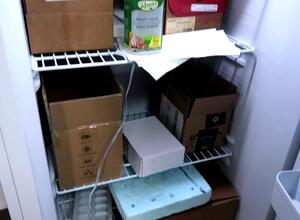
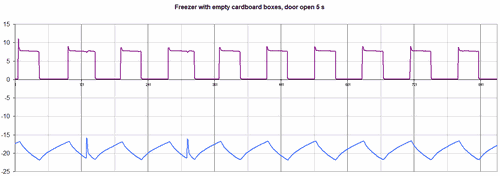 But When opening an empty upright freezer, all the cold air can just "fall out", so this may
not be realistic. I repeated the experiment with empty cardboard boxes in the freezer.
I used empty boxes because I didn't want to introduce too much thermal mass, because that would
make the effect harder to measure. Again I opened the door twice. Unfortunately, both
times were while the compressor was running, so I had to adjust that to equivalent idle time
based on the typical duty cycle. The numbers came out at around 6 and 7 minutes, so
definitely an improvement.
But When opening an empty upright freezer, all the cold air can just "fall out", so this may
not be realistic. I repeated the experiment with empty cardboard boxes in the freezer.
I used empty boxes because I didn't want to introduce too much thermal mass, because that would
make the effect harder to measure. Again I opened the door twice. Unfortunately, both
times were while the compressor was running, so I had to adjust that to equivalent idle time
based on the typical duty cycle. The numbers came out at around 6 and 7 minutes, so
definitely an improvement.
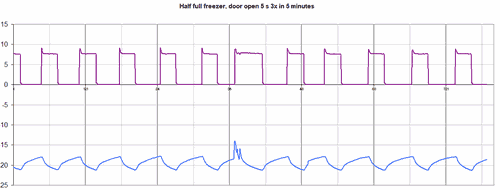 After I put the food in, I repeated the experiment again. But with all that thermal mass
of the food, the effect would be harder to measure. So I opened the freezer door three
times in a row, five seconds each time, two minutes between openings.
The freezer took more than an hour to reach steady state from that again, and it took
some number crunching to work out the equivalent cold lost per opening, but it came
out to 6.8 minutes per door opening. Very close to my results with the cardboard boxes.
After I put the food in, I repeated the experiment again. But with all that thermal mass
of the food, the effect would be harder to measure. So I opened the freezer door three
times in a row, five seconds each time, two minutes between openings.
The freezer took more than an hour to reach steady state from that again, and it took
some number crunching to work out the equivalent cold lost per opening, but it came
out to 6.8 minutes per door opening. Very close to my results with the cardboard boxes.
Given that this upright freezer was less than half full for my tests with food in it, I would say, for a freezer of this size, completely packed, you would probably have twice as long before running into problems with melting when the power goes out, so about 36 hours. This assuming it's in a room at 19° C (a cool basement). If it were in a hot garage at 30° C, the food would thaw in about 3/4 of the time.
And while the power is out, for each time the door is opened for five seconds, subtract 7 minutes.
Of course, a chest freezer will lose much less coldness each time its opened for five seconds. But sometimes you need to rummage through a chest freezer, so it may be open much longer from time to time.
It's also a matter of individual freezers and freezer size and what's in it. Larger freezers will stay colder longer than smaller ones. This particular freezer is a 14 cubic foot (380 liter) size. Heavy foods with high water content, such as berries or meats hold the cold better than lighter foods such as fries or bread.
 Does dusting out a fridge make a difference (video only)
Does dusting out a fridge make a difference (video only)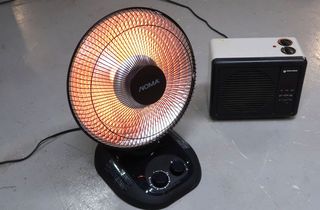 Infrared heater: How warm does it feel (video only)
Infrared heater: How warm does it feel (video only)